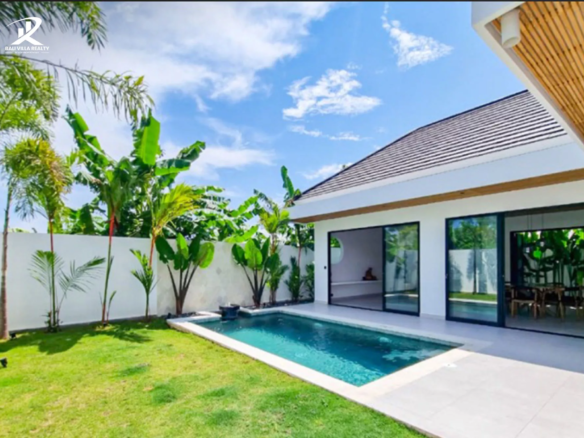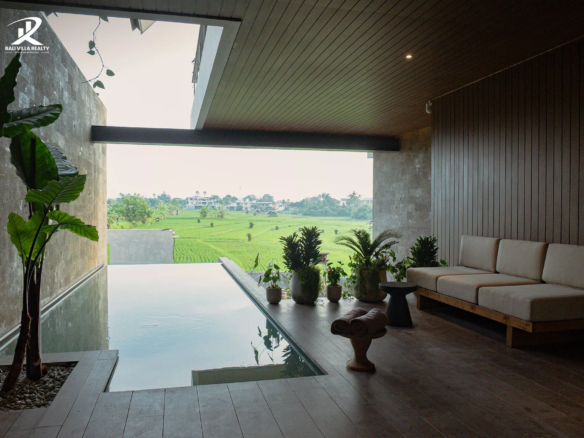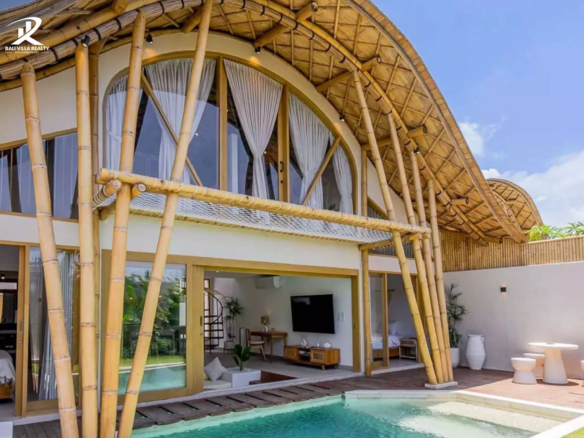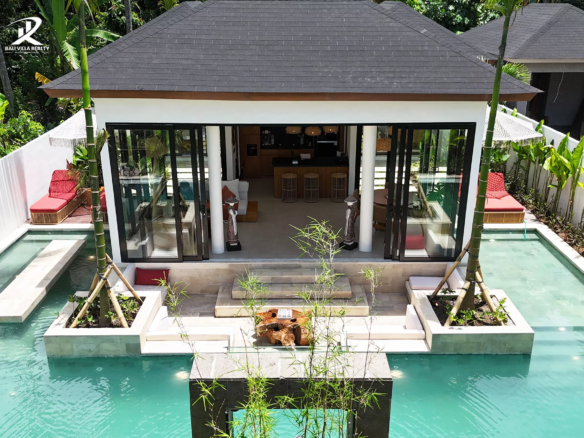Key Takeaways
| Feature | Rent Villa Monthly | Rent Villa Yearly |
| Flexibility | High | Low |
| Upfront Cost | Low | High |
| Cost Efficiency | Expensive | Cheaper overall |
| Stability | Short-term | Long-term |
| Utilities Included | Often Yes | Usually No |
| Ideal For | Newcomers, nomads | Expats, families, investors |
Many foreigners love renting villas in Bali for the long term—whether for a few months or several years. Since foreigners can’t own property directly under their names, leasehold agreements become the best solution.
But not everyone fits the same choice as others. Some people may prefer to rent yearly in Bali, but that doesn’t mean it’s the right path for you.
It all depends on your goals for visiting Bali. Each option also comes with its own process and level of commitment.
We’ve guided many clients through this decision, and we’ve seen both options work well. Let’s explore each one so you can decide which feels right for you.

Monthly Villa Rentals in Bali: Pros and Cons
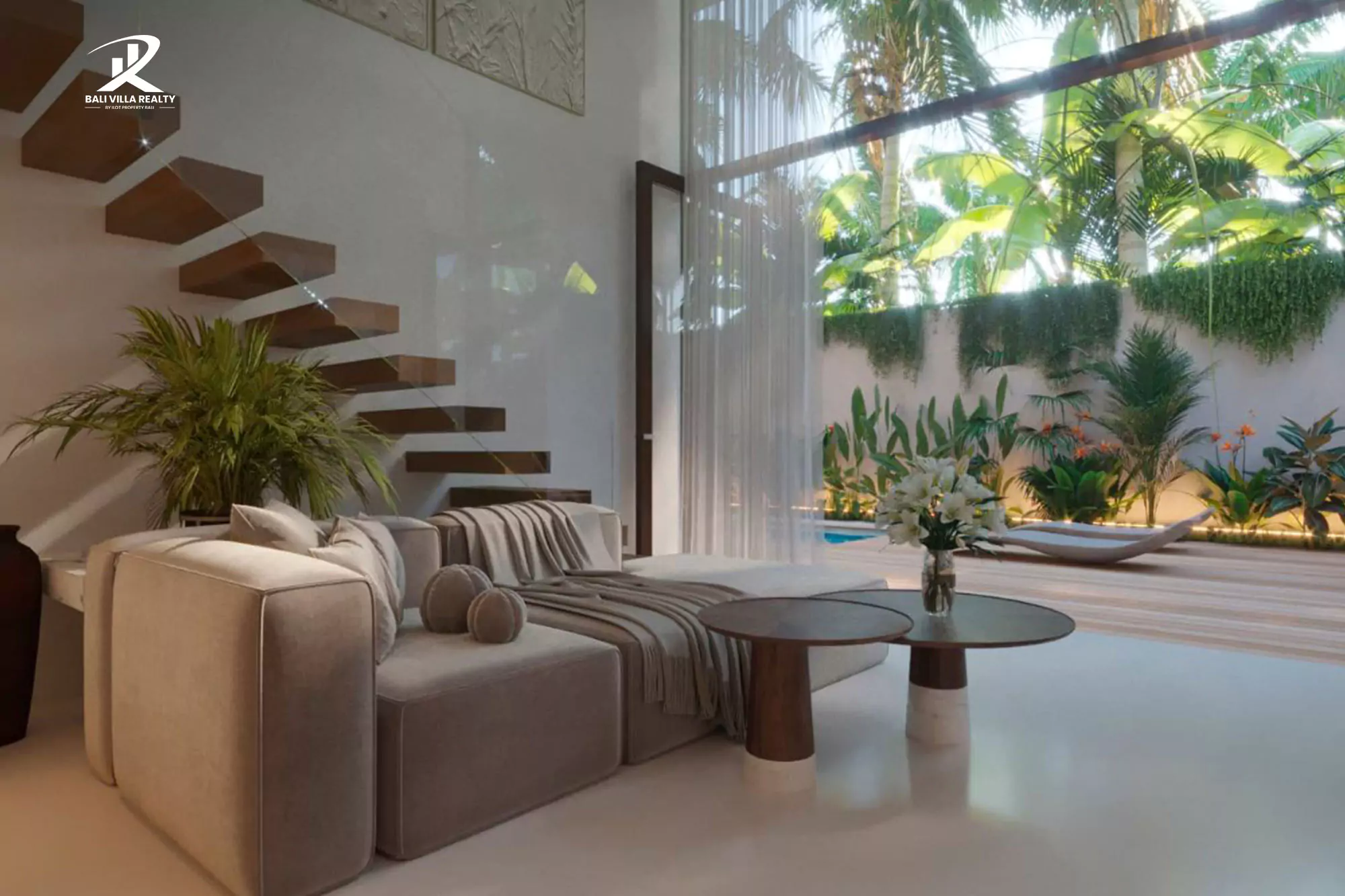
Renting month-to-month is the ultimate “try before you buy” experience. It’s perfect for newcomers or digital nomads who aren’t ready to settle down.
Think of it as “dating Bali”—you can explore different areas and villa styles without being tied down.
Pros of Monthly Rentals
- Ultimate flexibility: If you don’t like the area or find a better villa, you can move after the month ends without penalty.
- Lower upfront cost: No need for a big deposit. You keep more cash for experiences or investments.
- Test-drive locations: Spend a month in Ubud, then try Uluwatu, then Canggu—great for exploring.
- Often all-inclusive: Many monthly rentals cover Wi-Fi, pool cleaning, and garden care, simplifying your budget.
Cons of Monthly Rentals
- Higher cost: You’ll pay more per month than with a yearly lease.
- Lack of stability: Monthly contracts can end quickly, forcing frequent moves. Finding good places during the high season can be stressful.
- Price volatility: Rates can double during peak tourist months.
- Harder to feel settled: Constant moving makes it tough to create a sense of home or community.
Read More: Bali Villa Rental: How to Rent Monthly or Yearly Without Overpaying
Yearly Villa Rentals in Bali: Pros and Cons

Signing a yearly contract is a bigger commitment, but it’s also where Bali starts to feel like home. It’s best for those who know they want to stay for work, family, or a long-term lifestyle.
Pros of Yearly Rentals
- Significant savings: Paying upfront for a year often brings 15–30% discounts compared to paying monthly.
- Price stability: Rent stays fixed, so no surprise seasonal hikes.
- True sense of home: You can decorate, settle in, and build community.
- Visa benefits: A 12-month lease supports long-term visa applications like a KITAS.
Cons of Yearly Rentals
- Large upfront cost: One year’s rent is usually paid in advance, which can be a big hurdle.
- Less flexibility: If you dislike the villa or area, you’re stuck. Breaking leases often means losing your money.
- Maintenance issues: Some landlords delay repairs, leaving you to manage problems.
- Extra costs: Utilities, Banjar fees, and maintenance are often excluded.
Read More: What Happens After Your Villa Lease Expires?

Cost of Renting a Villa in Bali - Yearly vs. Monthly Comparison
The actual cost of renting a villa in Bali can vary. You might be wondering which option fits your budget best. Here’s a quick comparison between yearly and monthly rentals in Bali’s top areas:
| Location | Average Monthly Price (USD) | Average Yearly Price (USD) | Typical Savings |
| Canggu / Pererenan | $1,200 – $6,000 | $12,000 – $55,000 | 15–25% |
| Ubud | $800 – $3,500 | $8,000 – $35,000 | 10–20% |
| Uluwatu / Bingin | $1,200 – $4,500 | $12,000 – $42,000 | 20–30% |
| Seminyak / Kerobokan | $1,500 - $5,000 | $14,000 - $50,000 | 20–25% |
This means booking a villa yearly instead of paying month by month can save you hundreds of thousands of dollars (though depending on the area and villa size).
Things You Must Know Before Signing a Lease

Before you transfer any money, there are a few critical details to sort out. Getting these right will save you headaches down the road.
1. Visa Considerations
Your visa status and rental duration are closely linked.
- Tourist Visa (Visa on Arrival): Good for 30-60 days. Perfect for a one-month rental to test the waters.
- B211A Social/Business Visa: This is the go-to for stays up to 6 months. It aligns well with a 3-6 month rental term if you can find one.
- KITAS (Temporary Residency Permit): If you plan to live and possibly work in Bali for a year or more, you'll need a KITAS. Immigration authorities often prefer to see a 12-month rental agreement as proof of your commitment to residing here.
2. The Rental Agreement (Surat Perjanjian Sewa Menyewa)
This is your most important document. Never, ever rent a villa, especially long-term, without a formal contract.
- What to Check: Ensure the agreement clearly states the rental period, price, payment terms, and what is included (e.g., furniture, pool maintenance). It should also outline the responsibilities of both the tenant and the landlord regarding repairs and utilities.
- Use a Notary: For a yearly rental, we strongly advise having the contract drafted or reviewed by a local Bali notary (Notaris). This adds a layer of legal protection and ensures the person renting the villa to you is the legal owner or has the right to do so.
Conclusion: Which Rental Type Is Right for You?
After comparing yearly and monthly villa rentals in Bali, the best choice is the one that fits your lifestyle and goals.
- Choose monthly rental if: You’re new to Bali, prefer flexibility, have short-term visa, or don’t want a big upfront cost.
- Choose yearly rental if: You know where you want to live, prefer stability, have KITAS (for long-term stay), relocating with family or for business purposes.
Still feeling overwhelmed? You’re not alone. Bali’s rental market can be tricky, indeed.
Our team is here to help you find the perfect villa that fits your budget and timeline. Contact us for a free, no-obligation consultation if you need some help.
Want to start investing in Bali property?
Have a quick chat with our real estate experts for personalized advice on your Bali investments. No commitment required.
FAQ
Yes. Foreigners can legally rent villas long term through leasehold agreements, usually from 1 to 30 years. This is a secure and popular way to live in Bali without owning property.
Yes, Bali is generally safe. But renters should still be cautious. Look for properties with proper security features such as gated entrances, CCTV, and in-room safes to keep belongings secure. You can read more about Bali’s safety in our guide: Is Bali a Safe Place to Live? 5 Tips for Risk-Free Villa Purchase
Leasehold in Bali gives you the right to use and live in a property for a fixed term, typically 25–30 years. Once the lease expires, the ownership reverts back to the landowner.






